- Home
- Claire North
The Thief Page 6
The Thief Read online
Page 6
“Probably.”
“If it was within your code?”
“As I said before – it hasn’t been tested.”
On the third day, she cycled into the village, and he collected wood to burn and checked snares, and when she returned she laid her bicycle against the wall of the hut and said, patting the handlebars, “Without this, I think I would have died a long time ago.”
At the end of the first week, they sat side by side in silence, watching the stars come out between the trees, until at last he said, “I have some money you can have.”
“You help me with my work; I don’t need money.”
“Nevertheless, I have some; you could use it. Please don’t be…please accept it.”
“No,” she replied softly, pushing his open hand away from hers. “If I started spending baht, people would suspect. They’d wonder where I got it, and you’d be in danger.”
“There are ways around that, surely?”
“You play your games – tell me, are there any ways that aren’t a risk?”
“No. Probably not.”
“There you are.”
On the ninth day, she touched him lightly on the arm, an unconscious thing, a brush asking for attention.
He looked up, smiled, and she pulled immediately away, holding her fingers in the palm of her other hand, like a woman stung. Said a few empty words – we aren’t interested in what – and walked quickly away.
She could not remember the last time she had touched another person, but we can. Nine months and twenty-four days ago, a woman helped you pick up your bag when you dropped it, but you did not enshrine the feel of her fingers against yours in your memory, not knowing that it would be the last time a person would touch you for so many long, cold nights.
On the morning of the twelfth day they walked through the forest, setting snares and collecting roots, until at last she asked:
“Why is the game so important?”
“I told you – if I lose, I lose everything.”
“But why do you play? Why does it matter so much to you to be a player?”
“It’s…I like the victory. The…challenge. My days are not mundane. I do not sit and solve logistical problems; I do not try to get the trains to run between Mandalay and Rangoon; I am not tasked with moving crates in the harbours of Hong Kong or digging pits in Xian. It is not…daily dullnesses that oppose me, but rather brilliant minds. I fight brilliant minds, and when I win, when I know that I was better…but even in defeat, sometimes, there is joy. In witnessing the beauty, the brilliance of another player, of feeling your heart race, your face burn with the excitement of it, with the excitement of your plans, their plans; chance doesn’t enter as a factor: it’s not luck; it’s not nature; it’s just…me. My mind, the pieces and the game. It is…incredible. Perfect. I…would find it hard to give that up.”
They walked together a while longer, until she said, “But you were drunk.”
“What?”
“When you agreed to this game, the game you play now – you were drunk.”
“I…was. Yes. Abhik…played me well in that regard.”
“Did no one try to stop you?”
“I don’t know. I have a friend – I say ‘friend’. He’s a player, one of the oldest, possibly the very oldest still alive, friendship is always part of something else, enjoyable, perhaps, as all games are, but still…things within the house are never quite what they seem.”
“I don’t think that is what I’m asking.”
“Then what?”
“I think…I am asking if you are sure that this thing you are experiencing is happiness. Or, if it is happiness, if it is worthy.”
“It is only a game.”
“Does it do no harm?”
“It… I have a code,” he replied. “The game is what it is, but I have a code.”
“I think you have answered the question, therefore, for yourself.”
On the fifteenth day he put his hands on her shoulders, a silent greeting, a wordless comfort as she watched the forest. Her body turned, as if one part wanted to run, the other sink. Then she swallowed, lifted her chin, stood up and moved away.
That evening he said, “I cannot stay in one place too long.”
“Do you think your enemies will find you here?”
“I am sure they are still searching. Perhaps they assume I have slipped the net and have given up on this area. But I doubt it. Abhik will have cards he can play across the whole country – I’m sure he’ll be holding some pieces here. And I…there are things I must do.”
“What things?”
“Victory comes to the man who stays hidden the longest. I am a stranger in this country; even here, even with you, I cannot stay hidden for ever. I have questions that need answering. I do not understand why Abhik wanted to play this game. I do not understand why the Gameshouse permitted it to happen.”
“You said you were drunk?”
“The game isn’t balanced. Abhik has a natural, immediate advantage. He can hide in this country; his face is not remarked. My skin makes it harder for me to hide. He has resources he can access; had time to put his pieces in place – pieces more than those dealt in his hand. I did not. A game isn’t fun if it’s merely the inevitable destruction of an opponent. The Gamehouse might have intervened, balanced the bet before it was made, but it didn’t. That is…curious.”
She nodded quietly, eyes turned away from him into the forest. “If it is important to you, you must do it.”
In the night, they lay together on opposite sides of the hut. She turned her back to him as he undressed, and pulled her thin blanket high about her chin as she settled to sleep.
They lay, faces turned away, eyes open, pretending to sleep.
Chapter 22
The following morning he woke, and she said, “I’m going to get supplies.”
He watched her cycle down in the grey morning light while the forest whispered and the flies gathered with the rising day. He paced the edge of the hut for a while, and as light burnt the moisture away and the heat began to beat down even into the shade, driving it back, he paced the edges of the forest.
The sun rose higher and he walked and sat, and walked a little more, and drew dirt patterns with a stick on the floor, and stared into the sky, and walked, and waited.
Shortly after noon he heard the clattering of a bicycle on the path. He stood, breathless, though he didn’t know why, until she appeared, a bag on her back, basket full of fruit and uncooked rice tied in leaves. He opened his mouth to say – what?
A moment of could-have-been. We take in breath as he does, find ourselves ready to say sorry, farewell, hello, goodbye, adieu, let me stay, forgive me, be with me – why, all these dance on our tongue at that moment of inhalation, but for Remy…
…he said nothing at all, for she spoke first, slinging herself awkwardly off the bicycle which dropped where she left it, scampering towards him, her hands pressing against his arms in an instant, holding tight.
“You’ve got to go!” she hissed. “You have to go now!”
“I don’t…”
“I went to the village and they all stared at me, then looked away. The children stared, the old women stared, the mothers stared, the fathers stared, and when I went to go, the farmer’s son turned to his mother and said, ‘Will they take her too?’ The richest farmer in the town has a cart he rides to market – the cart wasn’t there and neither was he, but the market isn’t for three days. They must have seen you – you have to go.”
“This isn’t proof,” he replied, pulse pounding in the soft flesh beneath his tongue, throat tight, air thin. “This doesn’t mean…”
She pushed a bundle of rice wrapped in leaves into his hand. “You have to go,” she repeated. “They know.”
He gathered his meagre belongings in a daze, didn’t complain when she pushed a cup into his bag as well, and a wooden spoon. Then he stood before the fixed door of her hut, she in it, and said like one in a daz
e, “What about you?”
“I am not in danger of my life.”
“Aren’t you?”
“This game – will you win it?”
“I…Maybe. I don’t know.”
“Go,” she repeated with a little shake of her head. “Just go.”
He didn’t move.
“If you lose you are useless to me,” she said. “Go.”
He did.
Chapter 23
Anger is not a helpful emotion for a player.
He walks the rural paths again, away from the road, away from people, away from anything but the beating of the sun and the turning of the wind, and reminds himself that he is not angry. Angry at himself, angry at Fon, angry at Abhik Lee, angry at the Gameshouse, angry at…
Nothing of significance, he tells himself, and feels immediately guilty for feeling any thoughts except gratitude towards his sometime host.
He is not angry.
Angry is not helpful.
He reminds himself of this many times as he walks through the forest.
Chapter 24
At night, he settled down to sleep beneath the sheltering leaves of a drooping palm tree, and thought himself safe until he woke with a start and saw the torchlight flashing through the forest, heard the voices murmuring to each other in the dark, the crack of feet. How had they come so close, five hundred yards, maybe fewer, maybe four? He pulled his bag onto his back and ran, blind through the dark.
At the commotion, the others, the wanderers in the night, turned their light towards him, and someone gave a cry, and they ran also, charging after him through the busy, buzzing dark.
He ran until he came to a stream, and then he ran along that, gasping for breath, face streaming with sweat and tears, legs shaking, lungs breaking, and still they came behind him, one ahead of the others, barefoot and nimble, dressed in a long shirt and shorts held up with rope, his hair braided to his head – a tracker, no doubt the tracker, a piece played from Abhik’s Lee’s hand, more potent and dangerous than any hired help.
Remy ran, until he tripped and got straight back up, and knew the hot nothing he felt in his ankle would be a price he would pay later, and kept on running until his legs gave way, and his lungs failed, and belly burning, face popping, he dropped onto his hands and knees in the soil, rolled onto his back, shuddered and shook.
The running of his pursuer slowed a little behind him. Blinking back tears, he stared into torchlight, half glimpsing the reflection of the man who stood behind it, lean as a chestnut tree, a void in his expression that was all professionalism, a man about the job. He edged closer to Remy, and from his rope belt pulled a machete, and from around his belly undid more rope and, edging closer one step at a time, hovered over the fallen player, resting the tip of the blade just above Remy’s chest.
“You won’t kill me,” gasped the player in Thai. “It would be against the rules.” The man didn’t respond, showed no understanding in his face. “Abhik wins only when he tags me himself, only if I’m alive,” he said again in French. “You won’t kill me.”
French seemed to be more comprehensible, for the man’s blade immediately turned, the sharpened curve resting just below Remy’s right eye.
Alive, said the blade in silent steel, doesn’t necessarily mean unharmed.
Slow – so slow – the tracker squatted down by Remy’s side, the blade not moving from its point. Behind him, struggling to keep up in the dark, were the sounds of the other pursuers, less fleet of foot and sure of their way than this man. In a moment, the hunter would call out to them, summon them to the kill, and that would be that: game over.
Remy closed his eyes, drew in breath, and the hunter, perhaps sensing something of what this pertained, closed his lips tight. Then Remy rolled, knocking the blade to one side with the back of his arm while kicking up as hard as he could towards the hunter’s face. The hunter rolled too, pulling the machete free, but Remy threw himself bodily on top of the other man, ignoring the blade, ignoring the fingers that clawed at his face, trying to get purchase on his eyes, digging for the sockets. A moment in which all was leg and arm, too many limbs for anything to do any good, no order to the fight, merely elbows in guts, knees in groins, fists in faces, then Remy wiggled his elbow free from the medley and dropped down, point first, his entire body weight into the man’s throat.
The hunter’s eyes popped wide in his skull. He wheezed, staring up at nothing, and hands which had clawed and scratched now fell dully to the earth. Remy rolled free from his stricken attacker and, hearing still the sounds of the others in the wood behind him, turned and ran.
Chapter 25
Bitter wakings on a clouded morning.
Abhik Lee wakes to see the face of one of his players – a hunter, a good piece which he played well – standing before him.
The face is swollen, the neck bound up with cloth as if that might alleviate the puffed-up redness some. The hunter, when he speaks, does so in French, which he does not speak well, and his voice is hoarse.
“He got away.”
Abhik Lee leans the tips of his fingers against the spot between his eyebrows where, some have said, an invisible third eye resides, or where perhaps he simply felt the most irritation.
“He was on foot?”
“Yes. Going north. We are still looking; he won’t be far. He was injured.”
“How injured?”
“We fought. I hit him several times. He was limping too when he ran away.”
“You couldn’t catch a limping man?”
“He was more violent than you gave me to think. You said he would surrender easily; he was soft, fearful. You led us to believe that he could not survive in the wild for more than a few days.”
“That was the impression I had of him, certainly.”
“Your impression, monsieur, was wrong.”
The corner of Abhik’s nether lip contracts just a little, and again he taps his paired fingers against the centre of his forehead, once, twice, three times, steadying thoughts. He is not used to hearing that he is mistaken; it is an uncomfortable development for one of his inclination, and being uncomfortable, he now makes the greatest mistake of all, and ignores it.
“He will not survive long,” he repeats. “He doesn’t have it in him.”
And what of Remy?
We look, and here we find him at last, barely spotting him where he has fallen. He is nestled in between three stones that have no name, by the side of a rushing waterfall. He wakes slowly, in that he has barely slept and that grey land between sleeping and waking is all the expanse he now wanders. When at last he is fully alert, he simply lies there, looking up at the sky. He has lost the time and the direction of the sun; all he sees is cloud. His ankle is vastly swollen, and were the notion not so unproductively absurd, he might now lie in self-pity and weep.
Now he dreams of returning to Fon, and laments all the foolish things he both said and did not have the wisdom to say.
The sun rises and so must he.
We sit together, you and I, on a high rock above the waterfall, watching the foam surge in the depths below, and from this vantage point, we watch Remy limp away.
Chapter 26
A risk, but he has no choice.
At twilight, before a small monastery of aged monks and scuttling boys, he collapses.
The door is opened by an old man, who tuts and sighs at what he sees and leaves Remy there while he goes to fetch younger boys.
Two children, ten and twelve years old apiece, help him limp to a room which smells faintly of mould.
The very oldest of the monks, a man who walks with the aid of a round-headed stick, sits down to examine Remy’s leg, mutters and proclaims that yes indeed, it is beyond the monks’ medical skill! Bed rest, if you please – bed rest.
“Are you a criminal?” asked the young man, seventeen, orphaned and left to the care of the priests at two years old, as he sat by Remy’s side.
“No,” he replied.
“How
did you get this injury?”
“I fell.”
“Are you sure you aren’t a criminal? We welcome everyone here, regardless of their past.”
“I’m not a criminal.”
“Ah – but you are on the run, aren’t you?”
“Not from the law.”
“Are you sure?”
“I swear it.”
In the morning, the oldest monk came back to inspect Remy again and grumbled and proclaimed, “Yes, yes, bed rest, just like I said!”
In the afternoon, the abbot, younger than the oldest monk but vastly more political, came to greet their unexpected guest.
“Novelty upon novelty!” he exclaimed brightly. “A foreigner, injured, who speaks our language! Do you know anything about the path to enlightenment?”
“I hear rumours,” grunted Remy from his pallet on the floor, “that by good deeds and the making of merit for yourself in this life, you may advance through the wheel of the universe.”
“I think it is a wonderful thing that you have come to our monastery,” chuckled the abbot merrily. “For you, for us – for everyone!”
So saying, the abbot returned to his room and wrote a letter to his senior in the larger temple in the town informing him that the man wanted by the police had come to his temple and was there still a sizeable reward posted for his capture, and sent a boy to make sure it was posted and waited happily for the reply.
Chapter 27
On the second day of his stay in the monastery, the rainy season began.
Remy sat within the shelter of a dripping porch, listening to water on the slates above, watching the ground turn to a shimmering black mirror.
The youngest monk, the orphan, sat next to him and said,
“First I am the breath. Then when I am the breath, I am the air. I am the wind that moves through the sky. I am the leaves bending in the trees. I am the earth turning, the soil splitting, the dust that blows away. I am here and above and in all the corners of the earth. I am in the first gasp of the newborn child; I am in the last sigh of the dying mother. I am the sobs of the abandoned lover. I am the laughter of the delighted child. I am breath, I am wind, I am life, and when I am all of these things, I, the I that was simply me, that sat by you now, was nothing at all.”

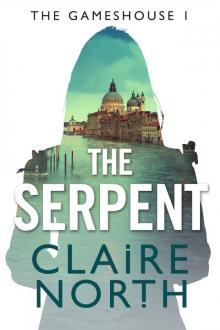 Gamehouse 01 - The Serpent
Gamehouse 01 - The Serpent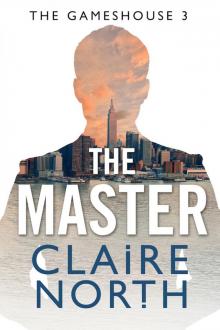 The Master
The Master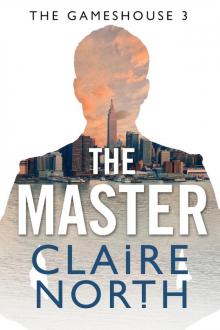 Gamehouse 03 - The Master
Gamehouse 03 - The Master The Thief
The Thief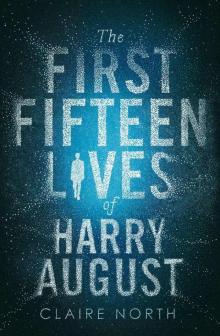 The First Fifteen Lives of Harry August
The First Fifteen Lives of Harry August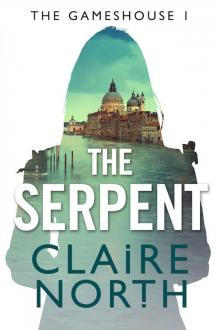 The Serpent
The Serpent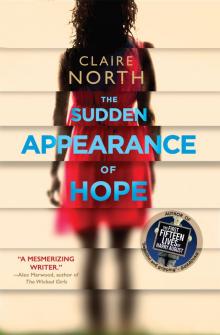 The Sudden Appearance of Hope
The Sudden Appearance of Hope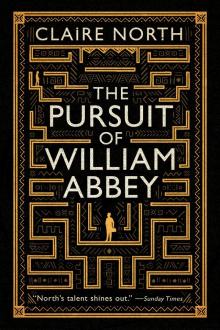 The Pursuit of William Abbey
The Pursuit of William Abbey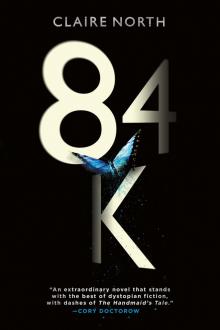 84k
84k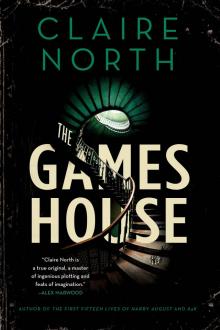 The Gameshouse
The Gameshouse Touch
Touch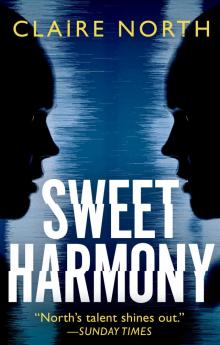 Sweet Harmony
Sweet Harmony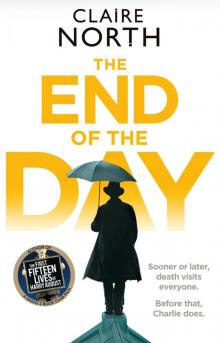 The End of the Day
The End of the Day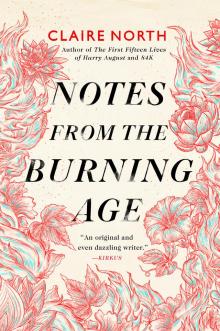 Notes from the Burning Age
Notes from the Burning Age